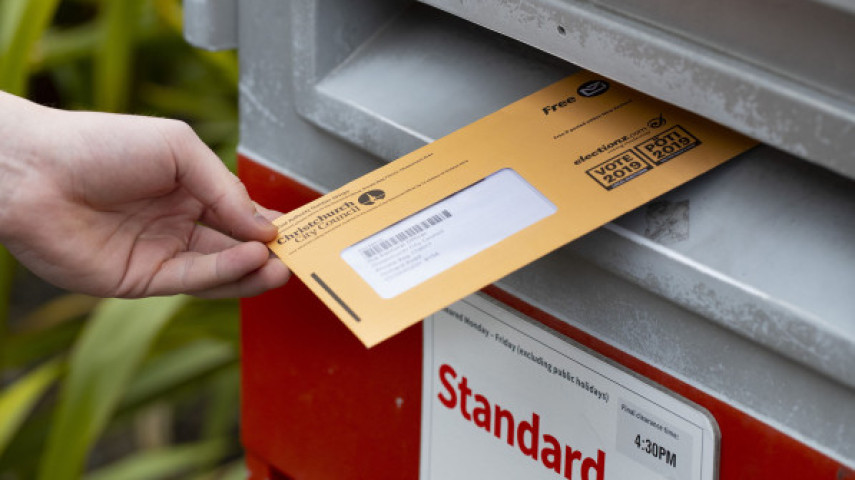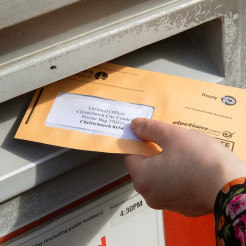During local elections, you can vote for the Mayor, a ward councillor, community board members and members of the Regional Council.

Local elections 2025
Council elections are conducted by postal vote.
For the 2025 local elections, voting documents were delivered between 9 September and 22 September 2025, and voting closed at noon on 11 October.
Each elector, after receiving their voting documents, should complete them, seal them in the return postage-paid envelope and deliver them to a vote bin.
If hand delivered, completed voting documents can be returned to Christchurch City Council Civic Offices, 53 Hereford Street, and Christchurch City Council libraries, customer service hubs, recreation and sports centres, the airport, some supermarkets and the UC library. Some customer service hubs may not be open on election day.

Vote bin locations(external link) are included in voting documents.
People who are eligible to vote but who do not receive a voting paper in the post are able to request and complete a special vote(external link).
Anyone who is not able to complete a postal vote independently due to disability is invited to contact the Elections team at elections@ccc.govt.nz or phone 03 941 8581.
Posting your vote
Put your completed voting papers in the postage-paid envelope. Don’t include anyone else’s voting papers in your envelope.
Deliver your vote to a voting bin(external link).
The details and profile statements for all candidates in local elections and by-elections are made available after the nominations close. This information will also be sent to electors with voting documents.
Christchurch City Council has two decision-making parts: the Council and Community Boards.
During the 2025 local elections, you can vote for:
- The Mayor
- A ward councillor
- Community board members for your local community board
- Environment Canterbury councillors
Find your ward and community board.
The term for elected members is three years.
Council
The Council is made up of the Mayor and 16 councillors. It makes decisions important to Christchurch as a whole.
All Christchurch voters elect the Mayor, while councillors are elected by voters from the ward they represent.
Community Boards
The six community boards represent their individual areas and cover three wards, with the exception of the Banks Peninsula ward, which has its own community board.
Each community board in the city has nine members, elected by voters from the areas they represent. The Banks Peninsula community board has eight. Councillors are also appointed to the community board covering their ward.
Community boards make decisions on local issues, activities and facilities, and help build strong communities.
Environment Canterbury
Environment Canterbury also holds elections at the same time as us. Find out more.(external link)
There are many reasons you could cast a special vote in an election, including:
- Your name does not appear on the final electoral roll, but you qualify as an elector.
- You have chosen to put your name on the unpublished (confidential) roll.
- You have moved since the electoral roll was compiled (and have lived at your new residential address for one month or more).
- You spoiled, lost or did not receive your ordinary voting document.
- You will be away from your residential address during the voting period.
- You are eligible to vote for some positions in the elections as a ratepayer elector (for a property you own but do not live in).
Special voting documents are available to electors:
- Whose names do not appear on the final electoral roll, but who qualify as electors.
- Who have not received a voting document previously posted to them.
- Who spoils or damages a voting document previously posted to them.
Special voting documents can be issued to electors Monday to Friday at all Customer Service Hubs(external link) during ordinary opening hours, and also at the following sites on Saturday, 11 October:
- Te Hononga Civic Offices – 9am to 12noon
- Beckenham Customer Service Hub (at Pioneer Stadium) – 10am to 12noon
- Linwood Customer Service Hub – 10am to 12noon
- Shirley Customer Service Hub – 10am to 12noon
- Matatiki Hornby Customer Service Hub – until 12noon
You can also phone 03 941 8999 or email elections@ccc.govt.nz
Completed voting papers must be returned to the electoral officer by post or in a vote bin(external link) by noon on election day.
Special voters must complete a statutory declaration. This is a legal requirement and a protection for electors against possible duplicate voting. If an elector requests a special vote and is not on the parliamentary roll, for example, they have just turned 18 years of age, or have moved, the person must enrol by Friday 10 October.
An application for registration as a parliamentary elector may be obtained:
- Online at www.vote.nz(external link).
- Calling 0800 36 76 56 to get a form sent.
- Emailing enquiries@elections.govt.nz.
- From Council Libraries and Customer Service Hubs.
After voting closes, special vote declarations are forwarded to the Registrar of Electors for verification that the elector is eligible and has enrolled as a parliamentary elector.
Special voting documents cannot be collected by candidates or their assistants for distribution to electors.
On election day, Saturday 11 October, completed voting documents can be returned to vote bins(external link) at all open Christchurch City Council libraries, recreation centres and other vote bin locations in the community and at supermarkets, and Christchurch City Council Te Hononga Civic Offices, until noon.
How to return your completed voting paper
We are not recommending that voting documents be posted after Tuesday 7 October 2025, as votes may not be received before the close of voting.
You can drop your completed voting papers into any of the orange vote bins at the following locations:
Christchurch International Airport
Council Customer Service Hub
Library
Recreation and Sport Centre
Supermarket
University of Canterbury
| Council locations |
|---|
| Christchurch City Council, Te Hononga Civic Offices, 53 Hereford Street |
| Akaroa Library, 2 Selwyn Avenue, Akaroa |
| Akaroa Customer Service Hub, 78 Rue Lavaud, Akaroa |
| Aranui Library, 109 Aldershot Street, Aranui |
| Beckenham Customer Service Hub, Pioneer Recreation and Sport Centre, 75 Lyttelton Street |
| Diamond Harbour Library, Waipapa Avenue, Diamond Harbour |
| Fendalton Library and Customer Service Hub, 4 Jeffreys Road, Fendalton |
| Linwood Library and Customer Service Hub, Eastgate Shopping Centre, first floor, Corner Buckleys Road and Linwood Avenue, Linwood |
| Little River Library and Customer Service Hub, 4236 Christchurch Akaroa Road |
| Lyttelton Library and Customer Service Hub, 18 Canterbury Street, Lyttelton |
| Matatiki Hornby Centre, 25 Smarts Road, Hornby |
| Matuku Takotako: Sumner Centre, 14 Wakefield Avenue |
| New Brighton Library, 213 Marine Parade, New Brighton |
| Ōrauwhata: Bishopdale Library and Community Centre, 13 Bishopdale Court, Bishopdale |
| Papanui Library and Customer Service Hub, 5 Restell Street, Papanui |
| Parklands Library, 46 Queenspark Drive, Parklands |
| Redwood Library, 339 Main North Road, Redwood |
| Riccarton Customer Service Hub, 199 Clarence Street, Riccarton |
| Shirley Library and Customer Service Hub, 36 Marshland Road, Shirley |
| South Colombo Library, 262 Colombo Street, Sydenham |
| Spreydon Library, 266 Barrington Street, Barrington |
| Te Hāpua Halswell Centre, 341 Halswell Road, Halswell |
| Tūranga, 60 Cathedral Square |
| Upper Riccarton Library, 71 Main South Road, Sockburn |
| Graham Condon Recreation and Sports Centre, 3 Sisson Drive, Papanui |
| Jellie Park Recreation and Sports Centre, 295 Ilam Road, Burnside |
| Pioneer Recreation and Sport Centre, 75 Lyttelton Street, Somerfield |
| Taiora QEII Recreation and Sports Centre, 193 Travis Road, New Brighton |
| Te Pou Toetoe Linwood Pool, 141 Smith Street, Linwood |
| Environment Canterbury, 200 Tuam Street |
| Supermarkets and community locations |
|---|
| Christchurch International Airport, 30 Durey Road, Harewood |
| Puaka James Hight Library, University of Canterbury, Ilam Campus, Ilam |
| Avonhead Woolworths, Corner Withells Road & Merrin Street, Avonhead |
| Belfast Woolworths, 755 Main North Road, Belfast |
| Christchurch Airport Woolworths, 530 - 546A Memorial Avenue, Christchurch Airport |
| Church Corner Woolworths, Corner Riccarton Road & Hansons Lane, Riccarton |
| Eastgate Woolworths, 6 Buckleys Road, Linwood |
| Ferrymead Woolworths, 999 Ferry Road, Ferrymead |
| Hornby Woolworths, 17 Chappie Place, Hornby |
| Moorhouse Ave Woolworths, 347 Moorhouse Avenue, Central City |
| New Brighton Woolworths, 12 Hawke Street, New Brighton |
| Northlands Woolworths, Corner Main North Road & Sawyers Arms Road, Papanui |
| The Palms Woolworths, The Palms Plaza, Marshland Road, Shirley |
| Woolworths Colombo St, 219 Colombo Street, Sydenham |
| Fresh Choice Edgeware, 61 Edgeware Road, Edgeware |
| Fresh Choice Fendalton, 376 Ilam Road, Bryndwr |
| Fresh Choice Lyttelton, 17 London Street, Lyttelton |
| Fresh Choice Parklands, 60 Queenspark Drive, Parklands |
| New World Bishopdale, Bishopdale Mall, Corner Farrington Avenue and Harewood Road |
| New World Durham Street, 175 Durham Street, Central City |
| New World Fendalton, 19-23 Memorial Avenue, Ilam |
| New World Ferry Road, 7-11 St John Street, Woolston |
| New World Halswell, 346 Halswell Road, Halswell |
| New World Ilam, 47C - 57C Peer Street, Upper Riccarton |
| New World Northwood, 2 Mounter Avenue, Northwood |
| New World Prestons, 420 Marshland Road, Marshland |
| New World St Martins, 92 Wilsons Road, St Martins |
| New World Stanmore, 288 Stanmore Road, Richmond |
| New World Wigram, 51 Skyhawk Road, Wigram |
| Pak'nSave Wainoni, 174 Wainoni Road, Avondale |
